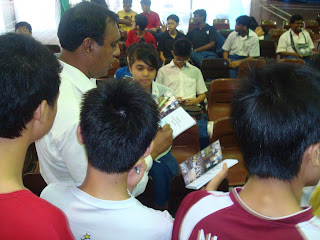

Students asking for autographs after the course.

New Town Secondary School. Medals course being conducted.
Northland Sec School. Pugalenthii conduc
.JPG)
Fu Chun Sec School
Sinda Motivational Course conducted at Sinda's Premises



New Town Secondary School. Medals course being conducted.
Northland Sec School. Pugalenthii conduc
.JPG)
Sinda Motivational Course conducted at Sinda's Premises
TEN STUDY TRAPS
1."I Don't Know Where To Begin."
Take Control.
Make a list of all the things you have to do.
Break your workload down into manageable chunks. Prioritize! Schedule your time realistically.
Don't skip classes near an exam -- you may miss a review session.
Use that hour in between classes to review notes.
Interrupt study time with planned study breaks.
2. "I've Got So Much To Study . . . And So Little Time."
Preview.
Survey your syllabus, reading material, and notes.
Identify the most important topics emphasized, and areas still not understood.
Previewing saves time, especially with non-fiction reading, by helping you organize
Adapt this method to your own style and study material
3. "This Stuff Is So Dry, I Can't Even Stay Awake Reading It."
Get actively involved with the text as you read.
Ask yourself, "What is important to remember about this section?"
Take notes or underline key concepts.
Stay on the offensive, especially with material that you don't find interesting,
4. "I Read It. I Understand It. But I Just Can't Get It To Sink In."
We remember best the things that are most meaningful to us. Try to elaborate upon new information with your own examples. Try to integrate what you're studying with what you already know. Some techniques include:
Chunking: An effective way to simplify and make information more meaningful.
Mnemonics: Any memory-assisting technique that helps us to associate new information with something familiar.
5. "I Guess I Understand It."
Test yourself.
Make up questions about key sections in notes or reading.
Keep in mind what the professor has stressed in the course.
Examine the relationships between concepts and sections.
6. "There's Too Much To Remember."
Information is recalled better if it is represented in an organized framework that will make retrieval more systematic.
There are many techniques that can help you organize new information, including:
Write chapter outlines or summaries; emphasize relationships between sections.
Group information into categories or hierarchies, where possible.
Information Mapping. Draw up a matrix to organize and inter-relate material.
7. "I Knew It A Minute Ago."
Try to recall the information contained in it.
Try answering the questions you made up for that section.
If you cannot recall enough, re-read portions you had trouble remembering.
The more time you spend studying, the more you tend to recall.
8. "But I Like To Study In Bed"
Recall is better when study context (physical location, as well as mental, emotional, and physical state) are similar to the test context.
The greater the similarity between the study setting and the test setting, the greater the likelihood that material studied will be recalled during the test.
9. "Cramming Before A Test Helps Keep It Fresh In My Mind."
10. "I'm Gonna Stay Up All Night 'til I Get This."
Avoid Mental Exhaustion.
Take short breaks often when studying.
Before a test, have a rested mind.
When you take a study break, and just before you go to sleep at night, don't think about academics.
Relax and unwind, mentally and physically.
It's more important than ever to take care of yourself before an exam!
Eat well, sleep, and get enough exercise.